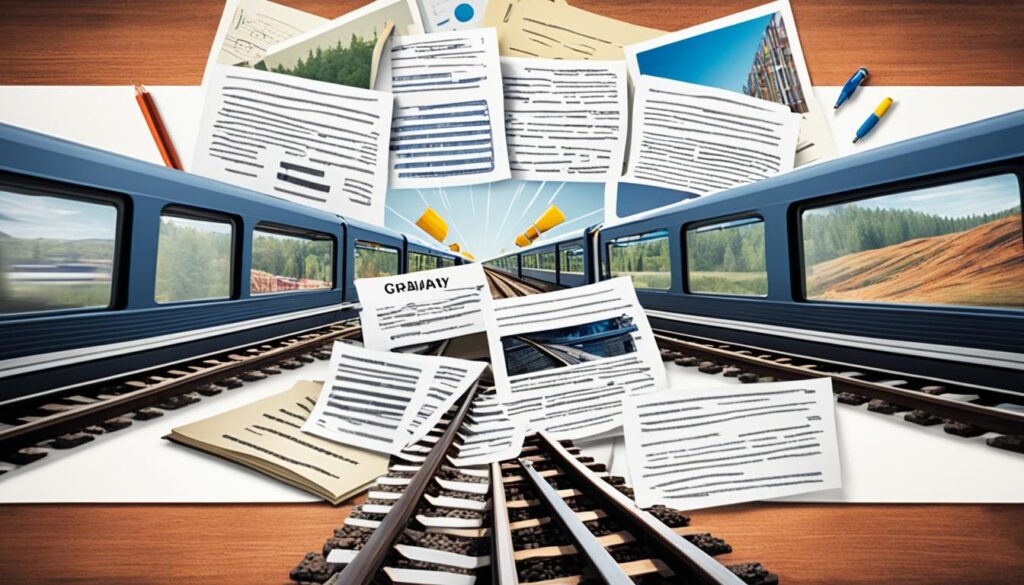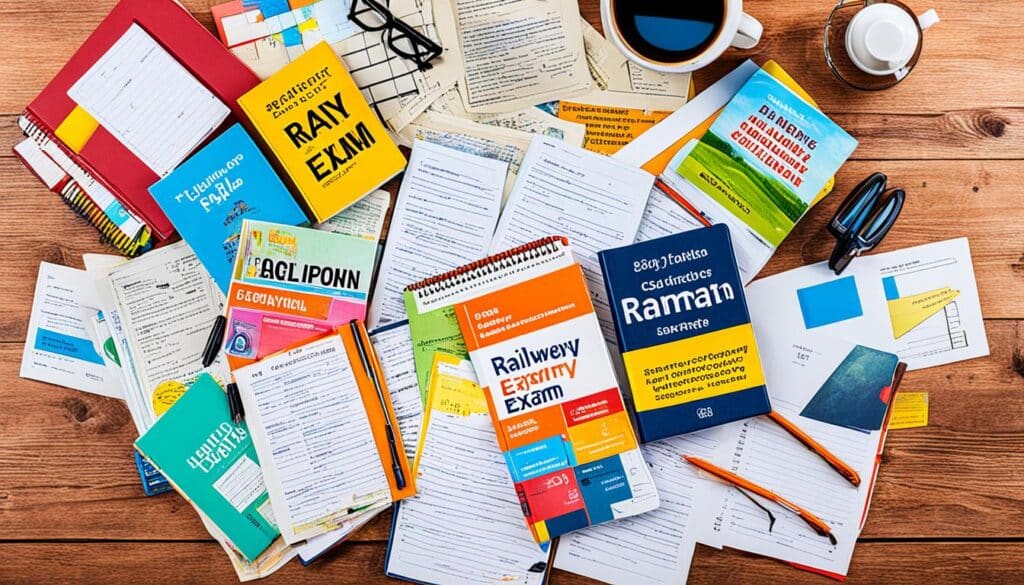The Railway Exam conducted by the Railway Recruitment Board (RRB) is one of the most competitive exams in the country. Aspiring candidates must understand the exam pattern, the syllabus, and effective preparation strategies in order to perform well. In this article, we will provide detailed information on how to prepare for the Railway Exam and offer valuable tips and insights to help you succeed.
Key Takeaways:
- The Railway Exam conducted by the Railway Recruitment Board (RRB) is highly competitive.
- Understanding the exam pattern and syllabus is crucial for effective preparation.
- Recommended books and study materials are available to enhance your preparation.
- Practicing previous year question papers and taking mock tests improve your performance.
- Time management and revision are essential for success in the Railway Exam.
Understanding the Railway Exam Pattern
Before diving into the preparation, it is crucial to understand the exam pattern of the Railway Exam. The exam pattern varies based on the specific exam, such as RRB NTPC, RRB JE, RRB ALP, and RRB Group D. Each exam has different sections and time limits. Candidates must familiarize themselves with the exam pattern to effectively plan their preparation strategy.
The exam pattern of the Railway Exam plays a significant role in determining the structure and content of the question paper. It provides candidates with an overview of the number of sections, marks allocation, and the total time duration. Understanding the exam pattern allows candidates to strategize their approach and allocate sufficient time to each section.
RRB NTPC Exam Pattern
The RRB NTPC exam consists of two stages: the Computer Based Test (CBT) and the Typing/Computer Based Aptitude Test (depending on the specific posts). The CBT is divided into various sections including General Awareness, Mathematics, General Intelligence and Reasoning, and General Science. Each section carries a specific weightage of marks, and there is a negative marking for incorrect answers.
RRB JE Exam Pattern
The RRB JE exam is also conducted in multiple stages. The first stage is the CBT, which includes sections like Mathematics, General Awareness, General Science, General Intelligence and Reasoning. The second stage is the CBT for various technical categories. The exam pattern for RRB JE varies depending on the specific categories and posts applied for.
RRB ALP Exam Pattern
The RRB ALP exam consists of two stages: the First stage CBT and the Second stage CBT. The First stage CBT includes questions from topics such as Mathematics, General Intelligence and Reasoning, General Science, and General Awareness. The Second stage CBT is a specialized exam based on the selected trade.
RRB Group D Exam Pattern
The RRB Group D exam consists of a Computer Based Test (CBT) that evaluates the candidates’ knowledge in areas like Mathematics, General Intelligence and Reasoning, General Science, and General Awareness. The CBT is followed by a Physical Efficiency Test (PET) and Document Verification (DV) for qualifying candidates.
Understanding the specific exam pattern for each RRB exam is crucial for effective preparation. It helps candidates identify the important topics and allocate time accordingly. By having a clear understanding of the exam pattern, candidates can optimize their preparation strategy and improve their chances of success.
Key Topics and Syllabus for the Railway Exam

In order to effectively prepare for the Railway Exam, it is crucial to have a clear understanding of the exam syllabus and the important topics that will be covered in each section. The Railway Exam consists of various exams such as RRB NTPC, RRB JE, RRB ALP, and RRB Group D, each with its own specific syllabus and topics.
For example, let’s take a look at the RRB NTPC exam. The important topics for this exam include:
- General Awareness
- Mathematics
- General Intelligence and Reasoning
Having a thorough understanding of the syllabus will help candidates prioritize their study materials and focus on the key areas that carry more weightage in the exam. By focusing on the important topics, candidates can allocate their time and resources effectively to strengthen their knowledge in those areas.
It is important to note that the syllabus and topics can vary for different exams. Candidates are advised to refer to the official exam notification or website for detailed information on the syllabus and topics specific to their chosen exam.
In the next section, we will explore the recommended books and study materials that can aid in the preparation for the Railway Exam.
Recommended Books and Study Materials for the Railway Exam

To effectively prepare for the Railway Exam, it is essential to have the right study materials. One of the first steps in your preparation journey should be finding reliable and comprehensive preparation books and study materials that cater specifically to the Railway Exam. These materials are designed to cover the Railway Exam syllabus and provide valuable insights and practice exercises.
For each specific exam, such as RRB NTPC, RRB JE, RRB ALP, and RRB Group D, there are numerous recommended books available in the market. These books offer detailed explanations of concepts, chapter-wise practice questions, and sample papers to help you understand and familiarize yourself with the exam pattern.
When selecting your study materials, it’s essential to consider your preferred learning style and the specific requirements of your chosen exam. Opt for books that align with your learning preferences, whether you prefer in-depth explanations, concise summaries, or ample practice questions.
“The key to success in any exam lies in the right study materials. Make sure you invest in high-quality books and study guides tailored specifically for the Railway Exam.”
In addition to traditional books, there are also a variety of online study materials available, such as e-books, video lectures, and online courses. These digital resources offer the convenience of anytime access and often come equipped with interactive quizzes and tests to help assess your progress.
To get started with your preparation, here are some highly recommended preparation books and study materials for the Railway Exam:
| Exam | Recommended Books and Study Materials |
|---|---|
| RRB NTPC |
|
| RRB JE |
|
| RRB ALP |
|
| RRB Group D |
|
Note: The above list is not exhaustive, and there are several other reliable resources available. It is recommended that you research further and gather multiple perspectives before finalizing your study materials.
Remember, while these books and study materials play a significant role in your preparation, it is essential to complement them with consistent study and practice efforts. Good luck with your Railway Exam preparation!
Preparation Tips and Strategies for the Railway Exam

Preparing for the Railway Exam requires a well-structured plan that incorporates effective strategies. Follow these preparation tips to enhance your chances of success in exams like RRB NTPC, RRB JE, RRB ALP, and RRB Group D:
Create a Study Schedule
One of the first steps in your preparation journey should be to create a study schedule. Allocate dedicated time for each subject and topic, ensuring a balanced approach to cover the entire syllabus. Stick to your schedule and maintain consistency to maximize your learning potential.
Stay Organized
Organize your study materials, notes, and resources in a systematic manner. Keep track of important dates, exam notifications, and deadlines. Create a study plan that aligns with your schedule and goals. Being organized will help you stay focused and avoid unnecessary stress during the preparation phase.
Practice Previous Year Question Papers
The Railway Exam often follows a predictable pattern. To familiarize yourself with the exam structure and types of questions, practice solving previous year question papers. This will give you an idea of the exam’s difficulty level and help you identify important topics and areas that require more attention.
Take Mock Tests
Mock tests are invaluable tools for exam preparation. They simulate the actual exam environment, allowing you to assess your knowledge, strengths, and weaknesses. Analyze your performance in mock tests and identify areas that need improvement. This will help you fine-tune your preparation strategy and build confidence.
Work on Time Management Skills
Time management is crucial in the Railway Exam, where you need to answer a large number of questions within a limited time frame. Practice solving questions under timed conditions to improve your speed and accuracy. Use techniques like prioritization and elimination to optimize your time during the exam.
Focus on Weak Areas and Regular Revision
Identify your weak areas and allocate extra time to strengthen them. Regularly revise the concepts and topics covered in the syllabus to reinforce your understanding. Highlight important formulas, key concepts, and shortcuts for quick reference during the exam. Additionally, make use of mnemonic techniques or visual aids to aid retention.
“Success in the Railway Exam lies in thorough preparation, disciplined study habits, and strategic approaches.”
By following these preparation tips and strategies, you will be well-equipped to tackle the challenges of the Railway Exam. Remember to stay focused, motivated, and maintain a positive mindset throughout your journey.
Continue reading to explore additional aspects of the Railway Exam and discover further strategies to enhance your preparation.
Typing Skills and Other Important Aspects of the Railway Exam

When it comes to the Railway Exam, certain important aspects can significantly impact your performance. While typing skills may be required for specific exams like RRB NTPC and RRB ALP, candidates should also focus on other crucial areas to excel in the exam.
Typing Skills
For exams that involve typing, such as RRB NTPC and RRB ALP, it is essential to practice and improve your typing skills. Typing with speed and accuracy can save you valuable time during the exam. Dedicate regular practice sessions to enhance your typing efficiency and become familiar with the keyboard layout.
Please note the image below as an example:
Other Important Aspects
In addition to typing skills, the Railway Exam also emphasizes other essential aspects that can contribute to your success. Here are some important areas to pay attention to during your preparation:
Time management: Efficient time management is crucial to complete the exam within the given timeframe. Practice solving questions under timed conditions to improve your speed and accuracy.
Accuracy: Ensuring accuracy is vital to score well in the Railway Exam. Pay attention to detail and avoid making careless mistakes that can cost you valuable marks.
Familiarity with computer-based tests: Most Railway Exams are conducted in a computer-based format. Familiarize yourself with the exam interface, navigation, and tools to be well-prepared for the actual exam.
By focusing on these important aspects, you can enhance your performance in the Railway Exam and increase your chances of success.
Group Study and Coaching Institutes for the Railway Exam
Preparing for the Railway Exam can be a challenging task, but with the right resources and support, you can boost your preparation and increase your chances of success. Two popular options that candidates often consider are group study and coaching institutes. Let’s explore how these methods can benefit you in your Railway Exam journey.
The Benefits of Group Study
Group study can be a valuable tool for Railway Exam preparation. By joining or forming a study group, you can collaborate with fellow candidates who share the same goal. Here are the advantages of group study:
- Conceptual Understanding: Discussing concepts with others can deepen your understanding and provide fresh perspectives. It allows you to clarify doubts, ask questions, and learn from different viewpoints.
- Study Materials Exchange: In a study group, you can share study materials, notes, and resources with each other. This collaboration ensures access to a wider range of references and enhances your learning experience.
- Peer Support: Studying with peers can provide emotional support and motivation. You can encourage and inspire each other throughout the preparation process, making the journey more enjoyable.
The Role of Coaching Institutes
Coaching institutes specialize in providing structured guidance and expert faculty for various competitive exams, including the Railway Exam. Here are the ways in which coaching institutes can support your preparation:
- Structured Curriculum: Coaching institutes design their curriculum based on the exam pattern and syllabus of the Railway Exam. They provide a comprehensive study plan, ensuring that you cover all the necessary topics.
- Expert Faculty: Experienced faculty members at coaching institutes have in-depth knowledge of the Railway Exam. They can provide valuable insights, tips, and strategies to help you prepare effectively.
- Study Materials and Mock Tests: Coaching institutes often provide study materials, practice sets, and mock tests specifically tailored for the Railway Exam. These resources help you gauge your progress and familiarize yourself with the exam format.
It’s important to note that while group study and coaching institutes can be beneficial, they are not the only ways to prepare for the Railway Exam. Your decision to opt for these methods should be based on your individual needs, preferences, and learning style.
Remember, the key to success in the Railway Exam lies in consistency, dedication, and thorough preparation. Choose the approach that works best for you and make the most of the available resources, whether through group study, coaching institutes, or a combination of both.
Next, let’s explore another valuable resource for Railway Exam preparation: online resources. These digital platforms offer a wide range of study materials, practice tests, and more. Keep reading to discover how online resources can enhance your exam readiness.
Online Resources for the Railway Exam

In the digital age, there are numerous online resources available for the Railway Exam. These resources can greatly aid candidates in their preparation for exams like RRB NTPC, RRB JE, RRB ALP, and RRB Group D. By utilizing these online resources, candidates can supplement their learning and gain a better understanding of the exam format and question patterns.
Some of the key online resources that candidates can leverage for the Railway Exam include:
- Online Coaching Platforms: These platforms offer comprehensive courses and study materials designed specifically for the Railway Exam. They provide expert guidance, interactive learning modules, and mock tests to help candidates prepare effectively.
- Study Materials: Numerous websites offer free study materials, including eBooks, notes, and video lectures, covering various sections of the Railway Exam. These materials provide in-depth explanations of concepts and practice questions for self-assessment.
- Practice Tests and Mock Exams: Online platforms provide practice tests and mock exams that simulate the actual Railway Exam. These tests help candidates assess their knowledge, identify weak areas, and improve their speed and accuracy.
- Previous Year Papers: Access to previous year papers helps candidates familiarize themselves with the exam pattern, types of questions asked, and the difficulty level. Solving these papers aids in building confidence and improving time management.
“Online resources provide the convenience and flexibility to study anytime and anywhere. They offer a wide range of study materials, practice tests, and expert guidance, making them invaluable assets for Railway Exam aspirants.”
By exploring and utilizing these online resources, candidates can enhance their preparation and increase their chances of success in the Railway Exam. These resources not only provide comprehensive study materials but also offer interactive platforms for clarifying doubts and seeking guidance from experienced educators and mentors.
Revision and Time Management for the Railway Exam

As the Railway Exam approaches, it’s crucial for candidates to prioritize revision and effective time management. Revision plays a pivotal role in reinforcing concepts and improving retention, giving candidates the confidence they need to perform well. By allocating dedicated time for revision, candidates can focus on important topics and solidify their understanding of key concepts.
One useful strategy for revision is to create a study schedule that outlines specific time slots for each subject or topic. This allows candidates to systematically review the material and ensure comprehensive coverage. It’s important to be realistic with the study schedule, considering other commitments and personal limitations. Break down complex subjects into smaller, manageable chunks and allocate sufficient time for each.
An essential aspect of revision is the practice of solving questions within the given time limits. This not only helps candidates become familiar with the exam format but also improves their speed and accuracy. Simulating exam-like conditions during practice sessions can help in developing time management skills and reducing exam anxiety.
While revising, candidates should focus on understanding the underlying concepts rather than merely memorizing information. It’s advisable to revisit difficult topics, work on sample questions, and consult additional study resources if needed. Consistency in revisiting topics will reinforce learning and boost confidence.
Throughout the revision process, candidates should prioritize their strengths and weaknesses. By identifying weak areas, candidates can allocate additional time for focused revision. Seeking guidance from mentors, friends, or online communities can provide valuable insights, alternative perspectives, and helpful learning resources.
To enhance time management skills, candidates should practice solving previous year question papers and mock tests. These practice sessions will help candidates gauge the time required for each section and improve their ability to answer questions efficiently. Regularly solving practice tests under timed conditions will train candidates to manage time effectively during the actual exam.
Key Takeaways:
- Prioritize revision and allocate dedicated time for it.
- Create a study schedule that outlines specific time slots for each subject or topic.
- Practice solving questions within the given time limits to improve speed and accuracy.
- Focus on understanding concepts rather than memorizing information.
- Identify and prioritize strengths and weaknesses for focused revision.
- Practice solving previous year question papers and mock tests to enhance time management skills.
By incorporating these revision strategies and effectively managing time, candidates can enhance their preparation for the Railway Exam and increase their chances of success.
Also Read : Explore Top Pharmacist Jobs Across The US
Conclusion
Successfully clearing the Railway Exam requires a comprehensive preparation strategy and dedicated effort. Candidates can improve their chances of success in exams like RRB NTPC, RRB JE, RRB ALP, and RRB Group D by understanding the exam pattern, focusing on key topics, using recommended books and study materials, following effective preparation tips and strategies, and practicing time management skills.
By familiarizing themselves with the exam pattern, candidates can understand the structure and allocate their time and efforts accordingly. It is essential to prioritize key topics and subtopics as per the exam syllabus to ensure thorough preparation. Choosing the right study materials, including recommended books, will provide candidates with comprehensive coverage and help them gain confidence.
Preparation tips such as creating a study schedule, practicing previous year question papers, taking mock tests, and revising regularly are essential for maximizing performance. Additionally, candidates should pay attention to aspects like typing skills, time management, and accuracy, depending on the specific exam requirements.
With dedication and consistent practice, candidates can achieve their goals in the Railway Exam and secure a successful career in the railway sector. By implementing a well-rounded preparation strategy and following the tips and strategies outlined in this article, candidates can enhance their chances of success and embark on a rewarding professional journey.
FAQs
Q: What is the Railway Exam and how do I prepare for it?
A: The Railway Exam is an examination conducted by the Railway Recruitment Board (RRB) to recruit candidates for various positions in the Indian Railways. To prepare for the exam, candidates should familiarize themselves with the exam pattern, syllabus, and previous year question papers.
Q: What are the eligibility criteria for the Railway Exam?
A: The eligibility criteria for the Railway Exam include educational qualifications, age limit, and nationality requirements. Candidates must meet the specified criteria to be eligible to apply for the exam.
Q: When will the Railway Exam for 2024 be conducted?
A: The exam dates for the Railway Exam 2024 have not been announced yet. Candidates are advised to regularly check the official RRB website for updates on exam dates and notifications.
Q: How do I apply for the Railway Exam?
A: Candidates can apply for the Railway Exam by filling out the online application form available on the official RRB website. It is important to carefully read and follow the instructions provided while applying for the exam.
Q: What is the exam pattern for the Railway Exam 2024?
A: The exam pattern for the Railway Exam 2024 typically includes subjects such as General Awareness, Mathematics, General Intelligence and Reasoning, and General Science. The detailed exam pattern will be mentioned in the official notification released by the RRB.
Q: How many vacancies are expected in the upcoming Railway Exam?
A: The total number of vacancies for the upcoming Railway Exam will be mentioned in the official notification released by the Railway Recruitment Board. Candidates should regularly check the official website for vacancy details.
Q: What are the important dates to remember for the Railway Exam?
A: Important dates such as exam application start date, last date to apply, exam date, admit card release date, and result declaration date will be mentioned in the official exam calendar released by the RRB. Candidates are advised to keep track of these dates.





